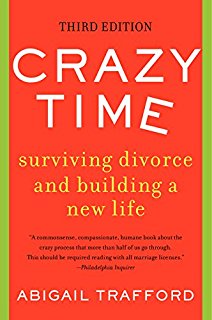While I became officially divorced just ten months into the 21st century, I received the news that my marriage was over at the end of the 20th. I faced Y2K and The Millennium as a divorcee. The implications of the end of the world as we knew it, and the promises of a new start, were both frightening and unfamiliar.
I’d had my suspicions about a possible breakup for several years before that summer in 1999, but I was still blindsided when it ended. And while I was not shocked when my ex-husband began dating (and eventually married) one of my then-closest friends, it was a staggering conclusion.
I had married somewhat young just before my 21st birthday. We were well into our 27th year as a couple and had achieved college degrees, witnessed the births of three daughters, and had moved many times around the country and the world. We had nearly three decades under our shared marital belt.
I hadn’t ever seriously thought about the reality of being single again. In fact, a few years later, when I checked off a box on some various form declaring myself as “single,” I shook my head in quizzical disbelief. “Wow, that’s weird,” I thought.
Those messy, topsy-turvy years are now well beyond me and I happily celebrate my tenth anniversary of remarriage this month. I hopefully am on my way to another 27 or more years of marriage. That said, when a newly-published book about surviving divorce appeared on the “new non-fiction” shelves, it caught my fancy. Sometimes I just need to validate that crazy time in my life and at the same time look for ways to help others survive it.
Mid-Life Ex-Wife by Stella Grey was one such book on the New Books shelf this summer. The version we have in Norwood is actually the American edition of a book by British author; it was originally published in a column format in the Guardian, the UK daily paper. The name Stella Grey is a pseudonym, of course, and the real author began to write for the Family page of the Guardian in 2014. Eighteen months of columns were published as a book in England titled The Heartfix. In May 2016, the American version was published as Mid-Life Ex-Wife.
The woman behind the Stella Grey name began her journey when her husband asked for a divorce. He was, simply, in love with someone else. They had no children and Stella was left dumbfounded and alone. In the first paragraphs of the book she writes that the sudden and unexpected news was “rather like that scene in Alien, in which John Hurt is sitting contentedly eating spaghetti … and then the infant monster burst out of his chest, leaving everybody [sitting with him] shocked and splattered.”
If this description brings a smile to your face, a nod to your head, or a tear to your eye, so will Stella Grey’s book. It’s shocking, funny, witty, cringe worthy (at times) and maddening. She documents her wild ride through the jolting and twisting of life after divorce.
Stella Grey was just 50 at the time and she wasn’t writing herself off. Yet.
I laughed and cried along with Stella’s whose experiences were unfortunately so familiar. Who thinks they will endure a first date again? Or a blind date? Or a bad date? Certainly not Stella! Or me.
Stella writes “When somebody announces that they’re leaving you, it’s a physical shock. It starts in your brain and reverberates through your bones.” The good news, though, is that it is, in fact, treatable and not terminal. Stella Grey wrote eighteen months of posts – a quest to find love again, one that naturally included her journey through dating and singlehood. Stella then met Edward and eventually shared her news about starting fresh, half of a new couple, over a year ago.
In the first few months of my separation, and eventual divorce, I consulted my library and read many books such as The Healthy Divorce and Helping Your Kids Cope, but very few practical and honest books about starting over.
But then I found Crazy Time – Surviving Divorce and Building a New Life by Abigail Trafford. Reading it, I realized that the roller coaster ride was a natural process. There were guffaws of laughter, sighs of relief, and sudden realizations that sunk me in my chair. Amid the “aha” moments, there was fear and grief. Amid the tears, there was hope and optimism.
Trafford first wrote Crazy Time in 1982, the second edition followed in 1992, and the third in 2014. It was the 1992 edition that I read. One reviewer on Amazon wrote “Who told {Abigail Trafford] all this information about me?” That the beauty of this book. It is your reality, your roller-coaster, and your survival that Trafford writes about. I gave copies of the book to my friends who were facing that same “crazy time,” of divorce.
Today, of course, there are more-recent self-help books about divorce – of building a new life, learning to date again (Internet and otherwise), surviving financially, and all the other sociological and psychological aspects. These titles include The Optimist’s Guide to Divorce by Suzanne Riss and Jill Sockwell (2016), A Judge’s Guide to Divorce – Uncommon Advice from the Bench by Roderic Duncan (2007), and Divorce – Think Financially, Not Emotionally by Jeffrey A. Landers (2015).
I don’t want to ignore books written specifically for men who are going through a divorce. Sam Buser and Glenn Sternes wrote The Guys-Only Guide to Getting over Divorce in 2009 and Sam Margulies wrote A Man’s Guide to a Civilized Divorce, published in 2004.
Margaret Atwood wrote “A divorce is like an amputation. You survive it but there’s less of you.” It’s learning to navigate the world before and the world after with fear, humor, courage and joy that can be made easier by the experiences of others.
Charlotte Canelli is the library director of the Morrill Memorial Library in Norwood, Massachusetts. Read Charlotte’s column in the September 21, 2017 issue of the Norwood Transcript and Bulletin.




